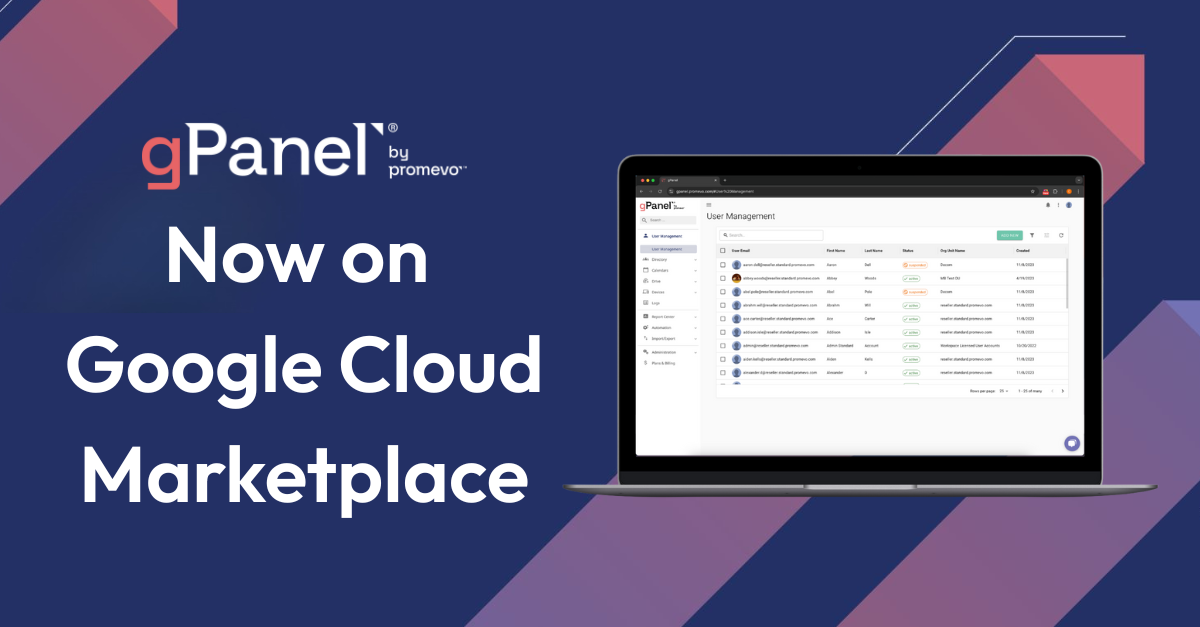3 min read
gPanel Enterprise: Now Available on the Google Cloud Marketplace
We’re thrilled to announce a major milestone in our partnership with Google Cloud: gPanel Enterprise, Promevo’s premier Google Workspace management...
As disruptive technologies like machine learning and artificial intelligence continue to change the modern business landscape, GPUs are in high demand. Not only do GPUs offer faster performance than traditional CPUs but they can also save time, free local resources, and even reduce costs.
Let’s take a closer look at Google Cloud GPU and explore the multitude of benefits.
A GPU is a Graphics Processing Unit, not to be confused with a Central Processing Unit (CPU).
GPUs are specialized programmable electronic circuits responsible for rendering images on a computer screen. Though typically associated with graphics-intensive workloads for video and 3D images, GPUs have proven to be an invaluable asset for programmers and engineers seeking to streamline workloads with machine learning.
Not to mention, GPUs are transforming the work of data scientists and offer significantly faster performance than CPUs when training neural networks associated with deep learning in AI.
A GPU has a parallel structure that enables higher efficiency compared to CPUs, meaning that GPUs can simultaneously perform multiple small processing tasks broken down from a larger task rather than performing a single large task in sequence. Many modern GPUs have hundreds or even thousands of processor cores which enable them to handle complex tasks significantly faster than a CPU.
And as impressive as physical GPUs are, they’re even more useful in the cloud.
Cloud GPUs are computer instances with robust hardware for running applications to accommodate substantial artificial intelligence (AI) and deep learning models in the cloud. Since these workloads are executed in the cloud, Cloud GPUs do not require a physical GPU on your device.
Cloud computation eliminates the burden of physical hardware and technology infrastructure by using remote servers to store and access data. Broadly speaking, cloud computation can be divided into:
Working in the cloud gives companies the ability to simplify operations and reduce overhead with virtual workstations while promoting experimentation and innovation. This is especially true when it comes to GPUs.
Google Cloud GPUs are an outstanding option for companies in need of high-performance computing. Even smaller organizations with limited resources can leverage the power of GPUs on Google Cloud to optimize their processing needs.
Here are some key benefits to consider.
Faster rendering times translate to dramatic improvements in workflow. Using Cloud GPUs, teams can accelerate machine learning modeling times from hours to mere minutes. This gives engineers more time to iterate solutions and focus on other projects.
Cloud GPUs don’t consume local resources, which helps computers run more efficiently. A demanding machine learning model or complex rendering task can make a local computer practically unusable when running. But by outsourcing computations to the cloud, local resources are freed up so devices can operate without interruption when running a GPU instance.
Whenever workloads are ready to increase, you can easily add GPUs on demand with Cloud GPUs. And if you need to scale down, GPUs can also be removed quickly.
Buying physical GPUs can be expensive, especially for large-scale operations. But with Cloud GPUs, costs are significantly reduced. Most major cloud providers like Google Cloud allow you to rent GPU servers on an hourly basis at an affordable rate.
When you choose Google as your Cloud GPU provider, Google Compute Engine provides GPUs that you can add to your Google Cloud virtual machine (VM) instances, which can be implemented to accelerate particular workloads on virtual machines. Google also offers a range of different GPU models to choose from which are tightly integrated with Google Cloud Machine Learning.
If you need a custom, enterprise-level GPU solution for your organization, get started with Promevo.
At Promevo, we help you harness the robust capabilities of Google to accelerate the growth of your company and give you the momentum you need to achieve your most ambitious business goals. As your trusted service partner, Promevo supports your business with a robust suite of services, including:
With our expert consultation, comprehensive support, and exceptional service from end-to-end, you can drive productivity and accelerate the growth of your business.
Meet the Author
Promevo is a Google Premier Partner for Google Workspace, Google Cloud, and Google Chrome, specializing in helping businesses harness the power of Google and the opportunities of AI. From technical support and implementation to expert consulting and custom solutions like gPanel, we empower organizations to optimize operations and accelerate growth in the AI era.

3 min read
We’re thrilled to announce a major milestone in our partnership with Google Cloud: gPanel Enterprise, Promevo’s premier Google Workspace management...

8 min read
As digital transformation continues to reshape the modern business landscape, many organizations are transitioning towards cloud hosting services for...

4 min read
Artificial intelligence (AI) and generative AI are top of mind for most businesses these days, and for good reason. Mounting evidence shows the...